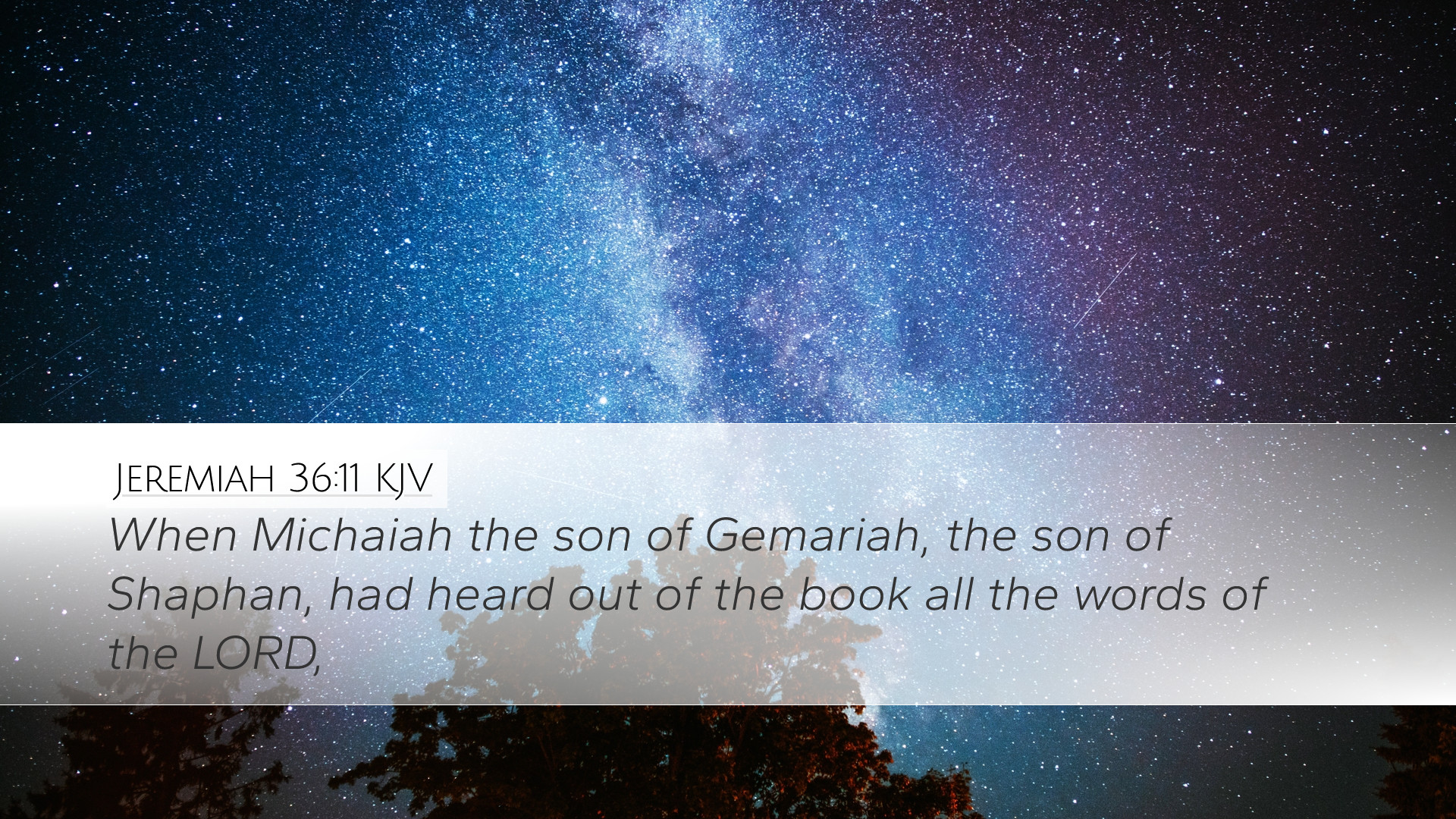Commentary on Jeremiah 36:11
Jeremiah 36:11 states, "When Michaiah the son of Gemariah, the son of Shaphan, heard all the words of the Lord out of the book." This verse serves as a pivotal moment in the narrative of Jeremiah, illustrating both the impact of divine revelation and the interconnectedness of societal and spiritual dynamics in ancient Israel.
Contextual Overview
To comprehend the full significance of Jeremiah 36:11, we must first establish the context surrounding it. This chapter unfolds during a time when Babylonian forces are a looming threat to Judah, and prophetic warnings are essential for understanding Israel's spiritual state and impending judgment. Jeremiah is instructed by God to write down His words, which Michaiah, a scribe's son, encounters and processes.
The Role of Michaiah
Michaiah's encounter with the scroll of Jeremiah is particularly significant. His lineage—being the son of Gemariah and a descendent of Shaphan—places him in a context of scribal and judicial authority, highlighting God's chosen vessels in the preservation and dissemination of His Word. Albert Barnes notes the importance of Shaphan, who had previously been a literary figure during Josiah's reform, linking Michaiah's actions to a tradition of faithful service to the Lord.
Implications of Hearing the Word
The act of listening to God's Word is paramount in this narrative. Matthew Henry emphasizes the necessity of attention to divine instruction, particularly amidst a society that has largely turned away from God. The response to God's revelation can catalyze change and ignite a spiritual renaissance.
The Authority of Scripture
Jeremiah 36:11 encapsulates the transition of God’s word from private revelation to public acknowledgment. As Adam Clarke comments, this moment signifies not only an individual’s encounter with scripture but also serves as a public declaration of God’s message to His people. The preservation of these writings becomes crucial, as they are meant to warn and direct the nations under God’s dominion.
The Preservation of Prophetic Words
The scroll’s existence indicates God’s commitment to His messages serving both as warnings and instructions. The way Michaiah hears and responds to these words matters deeply; it reflects a hierarchy of reception and action associated with scriptural authority. This theme of preservation is echoed throughout the biblical narrative, emphasizing that God's words are eternal and must be faithfully communicated and safeguarded.
Responding to God’s Message
The physical act of hearing leads to internal processing and eventual action, as inferred in subsequent verses when Michaiah shares the words with others, promoting further discussion and reflection. How one responds to God’s word reveals much about their spiritual state and accountability.
Spiritual Leadership and Accountability
Clarke highlights that leaders in the Scriptures, such as priests and scribes, have not only a duty to communicate God’s word but also a responsibility to embody it in their lives. This leads to a broader application for pastors and teachers today, suggesting that communication of scripture must be both accurate and effectual, prompting not just intellectual understanding, but spiritual transformation among their congregants.
Relevance for Today’s Believers
Jeremiah 36:11 resonates with contemporary believers, calling all to rediscover the importance of engaging with God’s Word. The urgency of reflection on scripture is paramount in an age marked by distractions and relativism. Henrietta Mears states, “You cannot praise God with your lips unless your heart is right, and you cannot have a right heart except through the Word.” Thus, immersing oneself in the Word leads to true understanding and appropriate response.
Encouragement for the Church
The narrative encourages a culture of attentiveness within modern congregations. Hearing should be coupled with action; as believers process the Word, they are compelled to share it, just as Michaiah did. The church today is encouraged to foster environments where scripture can be discussed, understood, and applied effectively.
Conclusion
In conclusion, the account in Jeremiah 36:11 serves as a rich source for study and reflection. It underscores the themes of revelation, reception, preservation, and action regarding God’s Word. For pastors, students, theologians, and scholars, there is much wisdom to be gleaned from consideration of both the historical context and the practical implications for life today.


